How to Use ChatGPT for Business in 2024: Top 40 Applications
As businesses continue to leverage artificial intelligence technologies to optimize their operations. ChatGPT has emerged as a powerful tool for its various use cases such as content creation, translation, web scraping, etc.
With so many potential use cases for ChatGPT, businesses may struggle to identify the most valuable applications of the technology and may face challenges to meet their unique requirements. Plus, to truly maximize the benefits of ChatGPT, businesses need the tool to be fine-tuned to meet their specific needs and objectives. For this, you can check our large language models fine-tuning article.
In this article, we explain the top 40 use cases of ChatGPT for business purposes.
General Use Cases of ChatGPT for Business
1- Content creation
Businesses can leverage ChatGPT for content creation to streamline and enhance their marketing efforts, enabling them to generate engaging, high-quality content more efficiently. By incorporating ChatGPT into their content strategy, companies can automate the production of:
- Blog posts
- Articles
- Social media posts
- Promotional marketing materials tailored to their target audience
Additionally, ChatGPT can assist in optimizing content for search engines through keyword research or content structuring, ensuring increased visibility and improved search rankings that can be especially useful for small businesses to create brand awareness.
Figure 1. ChatGPT SEO-friendly title suggestions for content in B2B marketing
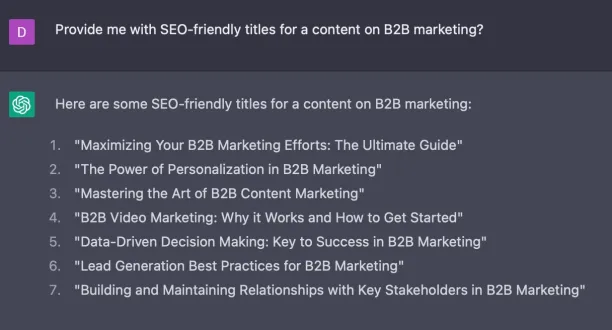
2- Language translation
Businesses can harness ChatGPT for translation services, enabling seamless communication across linguistic barriers in today’s increasingly globalized market. By integrating ChatGPT into their operations, companies can gain access to real-time, accurate translations for various content types, such as emails, reports, marketing materials, and product documentation.
3- Email and communication
Businesses can employ ChatGPT to enhance email and communication processes personalized to customers, leading to more effective and efficient internal and external correspondence. By using ChatGPT, employees can quickly draft, edit, and proofread emails, ensuring they are polished and professional.
Figure 2. ChatGPT providing an email template for a certain customer problem
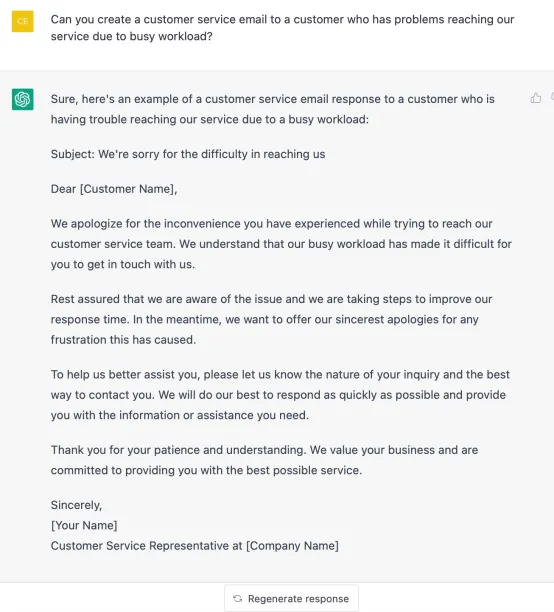
Furthermore, ChatGPT can be utilized to generate templates for recurring emails, such as:
- Sales pitches
- Follow-ups
- Meeting requests
This allows employees to maintain consistent messaging while saving time.
4- Idea generation and brainstorming
Businesses can use ChatGPT to generate ideas and facilitate brainstorming sessions, providing a creative and innovative approach to problem-solving. By integrating ChatGPT into brainstorming sessions, employees can input their initial ideas or problems, and the model can generate related concepts or potential solutions based on the given context.
Furthermore, ChatGPT can assist in refining ideas and proposals, offering feedback and suggestions to enhance the quality and feasibility of those ideas.
5- Creating presentations
By leveraging ChatGPT’s natural language understanding capabilities, employees can obtain suggestions for presentation topics, key points, and arguments based on their initial input or a specific subject area.
Figure 3. ChatGPT offers a presentation structure and key points to mention
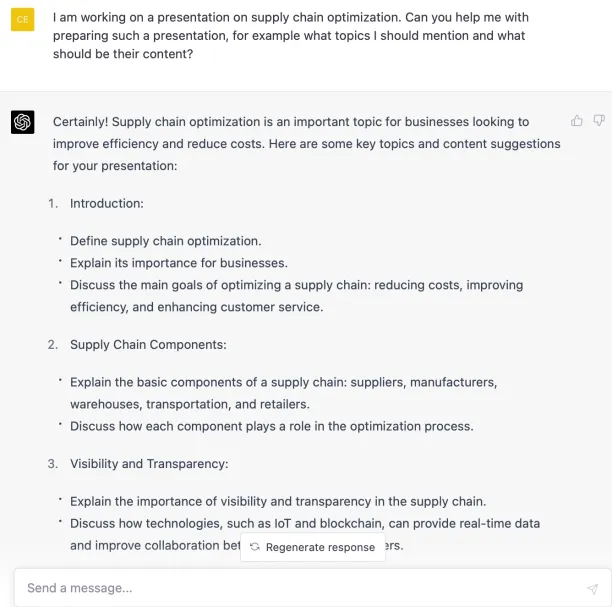
Furthermore, the AI tool can assist in generating concise and engaging text for slide content, ensuring that the core messages are conveyed clearly and effectively. ChatGPT can also help in crafting compelling headlines, bullet points, and speaker notes, allowing presenters to focus on the delivery and visual aspects of their presentations.
6- Employee training
Businesses can leverage ChatGPT to elevate employee training programs, providing customized and engaging learning experiences tailored to individual needs. By integrating ChatGPT into training platforms, companies can generate contextually relevant instructional content based on employees’ roles, skill levels, and learning goals, such as:
- Tutorials
- Case studies
- Quizzes
The AI model can also be utilized to answer trainees’ questions, offering instant support and clarification on complex topics or tasks. It can also assist in identifying knowledge gaps and suggesting targeted learning resources to bridge those gaps, ensuring continuous skill development and growth.
For more, check our article on ChatGPT education use cases.
7- Human resources
ChatGPT can assist in employee onboarding, providing essential information and guidance to new hires, and facilitating the orientation process. It can also help in forming interview questions for job positions.
Figure 4. ChatGPT creates a set of interview questions for a job position
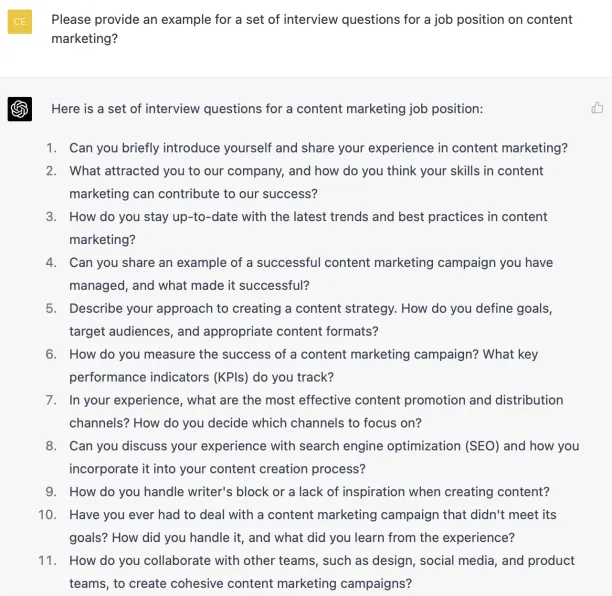
Furthermore, ChatGPT can be utilized to generate performance evaluations, feedback, and development plans, providing a more objective and data-driven approach to performance management.
Additionally, ChatGPT can be used to automate routine HR inquiries and tasks, such as updating employee information or answering frequently asked questions, freeing up HR personnel to focus on more complex tasks.
9- Web scraping
Web scraping helps extract structured data from websites. Businesses use web scraping as a powerful tool to gather information from the internet and gain insights for various purposes, such as:
- Gaining competitive intelligence for growth
- Lead generation via contact informations
- Sentiment analysis via customer opinions and reviews
Businesses can use ChatGPT in web scraping, for various applications like generating code for scraping websites (Figure 6) or cleaning extracted data.
Figure 5. Scraping from an Amazon product page
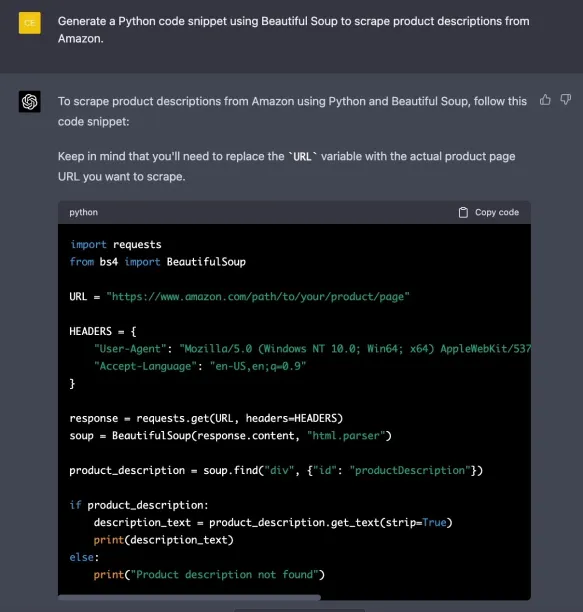
For more use cases, check our detailed article on ChatGPT web scraping.
10- Sentiment Analysis
In 2023, it is projected that 80% of businesses will embrace solutions incorporating sentiment analysis. This natural language processing (NLP) technique categorizes text, images, or videos according to their emotional content as positive, negative, or neutral. By doing so, it offers insights into consumer sentiments, enabling companies to create strategies for enhancing their products or services.
As generative AI models like ChatGPT progress, companies are able to automate natural language processing tasks and carry out sentiment analysis without the need for manual text data analysis.
For more on this, check our article on the use of ChatGPT for sentiment analysis.
Fine-Tuned & Customized Use Cases of ChatGPT for Business
Enterprises can customize and fine-tune large language models like ChatGPT, using their own data to create more efficient and domain-specific business tools. Fine-tuning allows the models to adapt to the unique requirements, terminology, and context of the organization, making them more effective for their specific use cases.
To achieve large language model fine tuning and customization, enterprises can follow these general steps:
- Data collection: Gathering relevant, high-quality, and diverse data that represents the specific domain or use case the organization wants to address
- Data preprocessing: Cleaning and preprocessing the collected data to ensure consistency and remove any sensitive or personally identifiable information
- Model fine-tuning: Using the preprocessed data to train the model in a supervised or unsupervised manner
- Evaluation: Assessing the performance of the fine-tuned model by using various metrics like accuracy, precision, or recall, depending on the application
- Deployment: Integrating the fine-tuned model into the desired business application
- Monitoring and maintenance: Continuously monitoring the model’s performance, collecting user feedback, and updating the model as needed
For detailed information on LMM fine tuning, check our article.
CUSTOMER SUPPORT
ChatGPT can be trained to understand and adapt to a business’s unique products, services, and brand voice, ensuring a consistent and tailored customer experience.
With customization, businesses can utilize ChatGPT to transform their customer support efforts, delivering timely, accurate, and personalized assistance through AI chatbot or support systems. By integrating ChatGPT into customer service platforms, companies can enable many applications:
11- Multilingual customer support
ChatGPT can be trained on a range of languages and can be integrated into the business chatbots. It has the potential to translate messages from one language to another, enabling effective communication between customers and businesses in different languages.
Figure 6. An exemplary multilingual customer response generated by ChatGPT
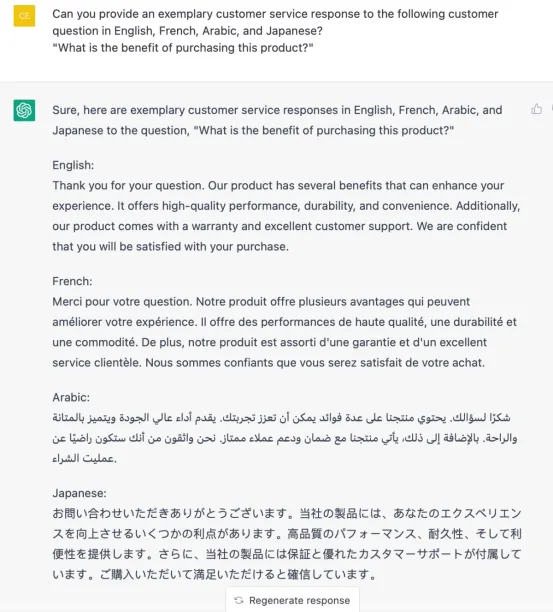
12- Answering FAQs
ChatGPT can be trained on a company’s FAQ page or knowledge base to identify and respond to frequent customer inquiries. When a customer submits a question, ChatGPT can examine the message and offer a response that addresses the customer’s inquiry or guide them to additional resources that may be useful.
13- Quick responses to customer inquiries & complaints
ChatGPT can be trained to detect and reply to typical customer complaints, such as problems with product quality, shipping delays, or billing errors. When a customer submits a complaint, ChatGPT can evaluate the message and offer a response that acknowledges the customer’s concerns and presents possible solutions to address the issue.
For more detail, check out our article on the use of ChatGPT for customer service.
SALES & MARKETING
Businesses can leverage ChatGPT to enhance their sales and marketing efforts, enabling them to reach their target audiences more effectively and efficiently. By incorporating ChatGPT into their sales and marketing strategies, companies can create many marketing opportunities:
14- Personalization of customer experience
ChatGPT can generate personalized content for customers that takes into account their preferences, past behavior, and demographics. This enables businesses to create targeted content that connects with their audience on a more personalized level, resulting in higher levels of engagement and conversion rates.
Sponsored:
Einstein GPT utilizes a network of models originating from the CRM market leader Salesforce’s AI research and generative AI providers like OpenAI. This enables users to leverage generative AI solutions within Salesforce.
15- Audience research
Audience research involves collecting information and insights about the target audience to gain a better understanding of their interests, preferences, behaviors, and requirements.
ChatGPT can be used to analyze customer data such as:
- Search queries
- Social media interactions
- Past purchases to identify patterns and trends in customer behavior
16- Writing product descriptions
Product descriptions are a fundamental aspect of marketing that furnish potential customers with information about a product’s features, benefits, and value. ChatGPT can assist in crafting engaging and informative product descriptions that align with the interests and preferences of the target audience.
17- Creating customer surveys
ChatGPT can help with creating customer surveys:
- Question generation
- Organizing survey structure
- Making surveys multilingual with its translation ability
- Survey analysis
18- SEO maximization for business websites
ChatGPT can be used in many elements of SEO content writing by utilizing its language processing capabilities. It can achieve functions like:
- Generating topic ideas for blog articles
- Finding the right titles
- Grouping search intents
For detailed information, check our article on ChatGPT use cases for marketing. For more on the SEO maximization, take a look at our article on the use of ChatGPT for SEO maximizing purposes.
LEGAL ASSISTANCE
ChatGPT can be trained on relevant legal texts, such as contracts, regulations, or legal opinions, to identify and extract key information, providing a better understanding of legal terms and clauses. Fine tuned versions of ChatGPT for legal assistance can help businesses in many ways:
19- Document review and analysis
ChatGPT can help legal teams analyze contracts, leases, and other legal documents to identify key clauses, potential risks, and areas for negotiation.
20- Compliance assistance
ChatGPT can provide guidance on regulatory requirements, helping businesses ensure that their operations, products, and services are compliant with applicable laws.
21- Legal chatbot
ChatGPT can be integrated into a company’s website or customer service platform to provide basic legal information to users, such as explaining terms and conditions, privacy policies, or answering frequently asked legal questions.
DATA ANALYSIS
Businesses can leverage ChatGPT to assist in data analysis, providing a more efficient and accurate approach to data processing and insights generation. ChatGPT can be utilized to analyze large volumes of unstructured data, such as social media posts, customer feedback, and support tickets, to identify patterns and trends.
Some data analysis related use cases for businesses can be:
22- Data exploration
ChatGPT can provide a more in-depth exploration of datasets by generating insightful summaries, identifying key trends, patterns, and relationships between variables. By asking questions or requesting specific analyses, analysts can leverage ChatGPT to dive deeper into their data and uncover previously hidden insights.
23- Data cleaning
ChatGPT can support data cleaning efforts by identifying inconsistencies, duplicates, or missing values, as well as suggesting the most suitable imputation methods, data transformations, or standardization techniques.
FINANCE & ACCOUNTING
By assisting in data analysis, ChatGPT can provide insights into financial trends and patterns, allowing for improved forecasting and budgeting. It can also assist in data entry, automating the input of data into financial spreadsheets or databases, reducing the risk of manual errors.
Some common financial use cases for businesses can be:
24- Financial document generation
ChatGPT can streamline the generation of financial documents by automatically creating accurate and well-structured reports, statements, and other documents essential for business operations. This can include:
- Financial statements
- Management reports
- Board and investor materials
25- Financial planning & advising
ChatGPT can serve as a valuable resource in financial planning and advising by offering guidance and support for businesses. For corporate financial planning, ChatGPT can help businesses create plans, budgets, identify investment opportunities, and manage financial risks. Furthermore, it can provide insights into various investment vehicles, assist with retirement planning, and help develop strategies to manage and reduce debt.
AUDIT
26- Reporting automation
Manual tasks like reporting can be both lengthy and prone to mistakes. ChatGPT can assist auditors in streamlining recurring duties, including documentation and reporting. In particular, it can generate uniform reports (see Figure 8) that ensure consistent presentation of results.
Figure 7: ChatGPT generated sample audit report
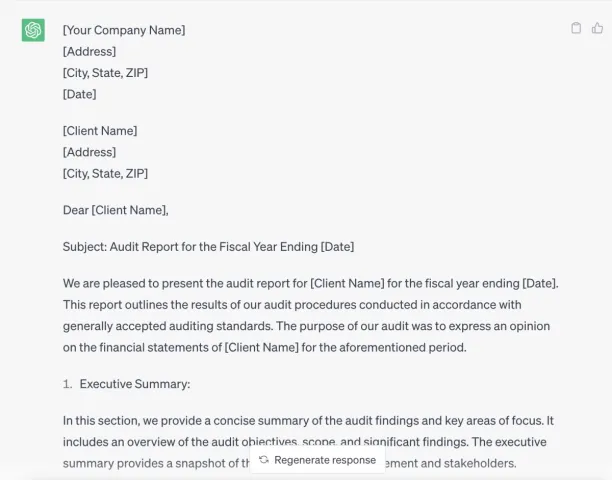
27- Audit data analysis
Audit initiatives often require regular examination of extensive financial and operational information. ChatGPT can facilitate some of these data analysis tasks, including:
- Carrying out calculations
- Compiling data
- Comparing datasets
28- Real-time risk monitoring
ChatGPT can also help in continuous risk monitoring. Auditors can engage with the model to delve into the organization’s operations, control mechanisms, and business context. ChatGPT can help auditors determine risk levels (Figure 9), pinpoint areas of heightened concern for further examination, and gain perspectives on possible threats.
Figure 8: Four uses of ChatGPT in real-time risk monitoring according to the model itself
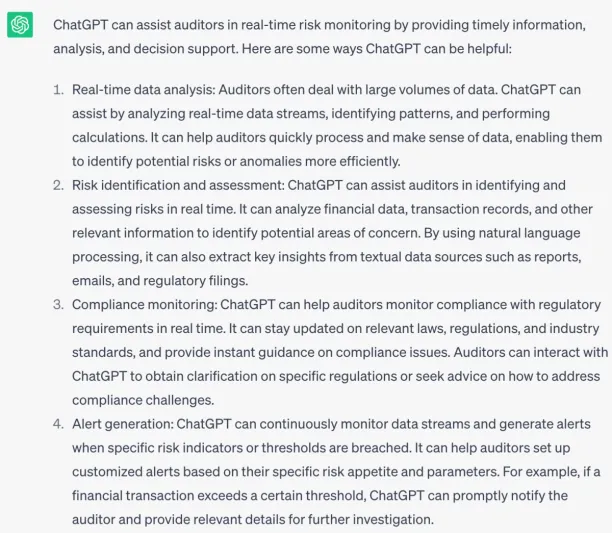
For more on the use of ChatGPT in audit, check our article.
However, it is important to note that ChatGPT is not a substitute for financial, accounting or auditing expertise and should be used as a supplementary tool to support financial and accounting operations.
SUPPLY CHAIN
29- Supply chain optimization
Businesses can utilize ChatGPT for supply chain optimization by streamlining and automating various processes across the supply chain, from procurement to distribution.
When fine-tuned, ChatGPT can analyze large volumes of data to identify trends, inefficiencies, and bottlenecks, allowing organizations to make informed, data-driven decisions to optimize operations. Additionally, ChatGPT can support communication between suppliers, manufacturers, and customers, enabling real-time collaboration and reducing lead times.
30- Supplier selection & evaluation
ChatGPT can help businesses evaluate potential suppliers by analyzing various parameters such as cost, quality, reliability, and lead time. It can also monitor supplier performance and provide recommendations for improvement or potential replacements.
MARKET RESEARCH & COMPETITIVE ANALYSIS
Businesses can employ ChatGPT in market research and competitive analysis to gain valuable insights and make informed decisions. ChatGPT can analyze vast amounts of unstructured data from various sources, such as social media, news articles, and customer reviews, to help with:
31- Intelligent customer segmentation
ChatGPT can help businesses understand their customer base in greater detail, using data to identify distinct customer groups based on demographic, behavioral, or transactional characteristics. By leveraging the AI’s natural language processing capabilities, businesses can also uncover patterns in customer feedback, preferences, and concerns that enables them to tailor marketing strategies.
32- Predicting customer behavior
ChatGPT can analyze customer data to predict their behavior, such as their likelihood to make a purchase or their propensity to churn. This can help businesses create personalized offers and experiences that are tailored to individual customers.
33- Product development & pricing comparisons
ChatGPT can analyze competitor product offerings to identify gaps in the market that a business could fill. This can help businesses develop new products that are more competitive and meet customer needs better.
Also, it can help businesses analyze their competitors’ pricing strategies, including their discounts and promotions, to help them develop their own pricing strategy and stay competitive.
IT OPERATIONS
AIOps in conjunction with the power of ChatGPT can streamline IT automation efforts as these technologies can provide user-friendly interaction and simplified data analysis.
34- Automated troubleshooting
When an IT problem emerges, AIOps can promptly assess the scenario and determine the primary source of the concern using real-time data combined with past trends. After identifying the issue, AIOps can initiate remedial measures by activating ChatGPT.
35- Incident management
ChatGPT can be incorporated into an ITSM (IT Service Management) platform, acting as an efficient virtual assistant for managing user inquiries and automating the solutions to frequent issues. Users can communicate with the chatbot powered by ChatGPT whenever they face a problem. Based on the AIOps insights, ChatGPT can see potential issues and provide the user with an accurate and timely response.
36- Proactive alerts and notifications
AIOps and ChatGPT form a powerful combination for active anomaly detection and problem remediation. AIOps persistently monitor the IT infrastructure, rapidly spotting irregularities or potential concerns. When an anomaly arises, ChatGPT can convey the details to the appropriate IT units, hastening the incident management procedure. This collaborative strategy facilitates prompt detection and intervention of irregularities before they intensify.
37- Automated ticketing
IT support teams frequently deal with high ticket volumes, causing resolution delays and unhappy customers. With Generative AI, processes can be streamlined and major issues can be prioritized. ChatGPT AIOps can automate ticketing by identifying issues. Chatbots classify tickets, collect key details, and solve basic problems autonomously. This speeds up responses, boosts efficiency, and enhances customer satisfaction by providing prompt updates and expected resolution timelines.
38- Create and maintain knowledge base
Given that ChatGPT can produce text similar to human writing, including detailed articles, manuals, and IT-related documentation, it’s feasible to build and uphold a vibrant knowledge repository using insights from AIOps tools. ChatGPT AIOps aids companies in sustaining a current and informed knowledge base, ensuring that IT personnel remain educated and empowered.
39- IT resource optimization
AIOps technology continuously analyzes resource use and performance across an organization’s IT infrastructure, monitoring components like servers, databases, and applications. For instance, if during peak hours AIOps detects a key application nearing capacity and underperforming, it can alert ChatGPT with relevant data. ChatGPT can then suggest solutions, such as reallocating resources or expanding infrastructure to handle the extra demand.
40- Coding for IT DevOps
AIOps tools can utilize ChatGPT for easing coding activities. By tapping into ChatGPT’s natural language understanding and generation features, developers can communicate with the system in straightforward English and get immediate Python code samples and support. This optimizes coding chores, lessens the dependency on profound coding knowledge, and quickens the prototype creation phase.
For more on the use of ChatGPT in AIOps, check our article.
If you have any questions or need help in finding vendors, we can help:

Cem has been the principal analyst at AIMultiple since 2017. AIMultiple informs hundreds of thousands of businesses (as per similarWeb) including 60% of Fortune 500 every month.
Cem's work has been cited by leading global publications including Business Insider, Forbes, Washington Post, global firms like Deloitte, HPE, NGOs like World Economic Forum and supranational organizations like European Commission. You can see more reputable companies and media that referenced AIMultiple.
Throughout his career, Cem served as a tech consultant, tech buyer and tech entrepreneur. He advised businesses on their enterprise software, automation, cloud, AI / ML and other technology related decisions at McKinsey & Company and Altman Solon for more than a decade. He also published a McKinsey report on digitalization.
He led technology strategy and procurement of a telco while reporting to the CEO. He has also led commercial growth of deep tech company Hypatos that reached a 7 digit annual recurring revenue and a 9 digit valuation from 0 within 2 years. Cem's work in Hypatos was covered by leading technology publications like TechCrunch and Business Insider.
Cem regularly speaks at international technology conferences. He graduated from Bogazici University as a computer engineer and holds an MBA from Columbia Business School.
To stay up-to-date on B2B tech & accelerate your enterprise:
Follow on
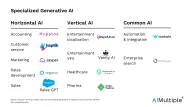
Comments
Your email address will not be published. All fields are required.